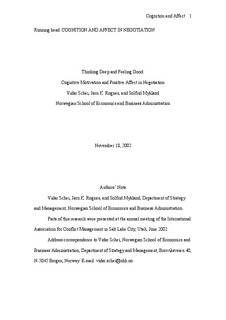| dc.contributor.author | Schei, Vidar | |
| dc.contributor.author | Rognes, Jørn K. | |
| dc.contributor.author | Mykland, Solfrid | |
| dc.date.accessioned | 2007-06-28T08:22:26Z | |
| dc.date.available | 2007-06-28T08:22:26Z | |
| dc.date.issued | 2002-11 | |
| dc.identifier.issn | 1503-5093 | |
| dc.identifier.uri | http://hdl.handle.net/11250/164292 | |
| dc.description.abstract | This article examines how individual differences in cognitive motivation and positive
affect influence the outcome in integrative dyadic negotiations. The cognitive
motivation and positive affect of 64 participants were measured prior to a simulated
negotiation. At the individual level, high cognitive motivation strongly improved the
outcome for the sellers, but not for the buyers. When cognitive motivation was low,
positive affect enhanced the quality of the outcome for the sellers. The dyadic
outcome was positively affected by both the individual difference variables. Cognitive
motivation was more important than positive affect, and characteristics of the sellers
were more important than those of the buyers. | en |
| dc.language.iso | eng | en |
| dc.publisher | Norwegian School of Economics and Business Administration. Department of Strategy and Management | en |
| dc.relation.ispartofseries | Discussion paper | en |
| dc.relation.ispartofseries | 2002:2 | en |
| dc.title | Thinking deep and feeling good : cognitive motivation and positive affect | en |
| dc.type | Working paper | en |
| dc.subject.nsi | VDP::Samfunnsvitenskap: 200::Psykologi: 260::Organisasjonspsykologi: 268 | en |
